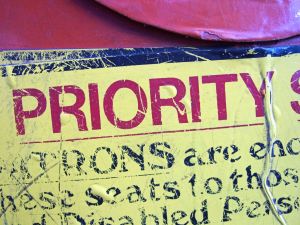Coming from the “cult-like” GTD background I have been shaped to believe that there is no such things as priorities, that something is important or it isn’t and that we can intuitively figure it out without a 1, 2, 3 – A, B, C type of prioritization code. Yet, the masses of people in the corporate world hang onto prioritization for dear life and with it do work that may not be important to them at all.
The definition and the attitude
I’m somewhat simple when it comes to figuring things out. That’s why I like definitions. It’s hard to talk about something without knowing what that thing means. So, priorities are: “Precedence, especially established by order of importance or urgency.” So, a priority is a list of stuff in order of what is most important. But important to who? And how do we know what is more important than something else. My wife and I discuss (argue) about what is more important to me during the week. Is it programming? Writing? How about washing the dishes? What is my highest priority? Also, during work meetings we talk about how we will “balance and manage our priorities” and how we need to “prioritize” our work. Like I said before, I have ingrained and strong opinions about prioritization and the lack of it. I truly believe that something should either have your attention or it shouldn’t. I don’t think that we really need to put stars and colors next to our tasks to show how important they are. We need to find our attention and stick to it.
Why not applying your attention to what really matters is dangerous
I really do like what Mr. Merlin Mann speaks about in his time and attention talks. He believes (and pontificates) that all we have is time and attention and that priorities may not really work. What it comes down to is understanding what is important in your life and then devoting attention and focus to it; not to worry about what has a bigger star next to it and what order it falls into. Your A, B, C – 1, 2, 3 system may help you sort the important things in your list of tasks, but I know that just taking a quick read through what is on your plate will easily show you where your time and attention needs to be drawn to. And that is the key. We need to concentrate on what is important to us: not what some external force deems as important. Applying attention to what you and outside entities have agreed on as a priority (this can be work, family, or even friends), and not to what you feel is more important is a sure fire way to not pay attention to what your calling is. In fact, this difference between what is important to you and what is important to other entities is grounds to grow some awesome resentments, produce little, and grow bring about procrastination.
Identify and attend to
So, instead of listing out what you think is important try to step back and identify the top 5 to 7 things that are important to you. Then throw out the rest. Seriously, if you have more than 7 “Areas of Responsibility” on your plate you are probably spreading yourself too thin. I know that I would be. So to be a good sport, here are my top areas of attention:
Husband Friend Personal and spiritual Health Employee of Erie Insurance Editor at Lifehack Software development and writing
Anything outside of that is just cruft or fun. I know it’s hard to swallow, especially if you were or are a “yes man” like I once was, but the fact is that you can only devote your attention to so much, and that has to be devoted to what you deem important. If you can cut out all the excess stuff that is in your life, you know, the stuff that you are failing at “prioritizing”, then you can get some real work done and even become a better person while doing it. Instead of prioritizing all of your work try identifying was is totally important to you apply your attention to that.
